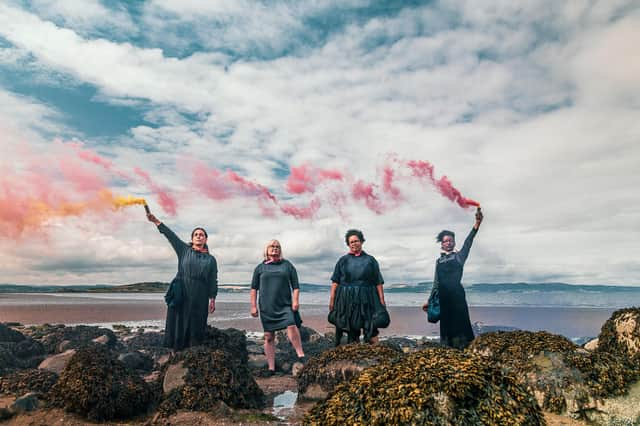Fringe theatre reviews: Move | Looking for América | Ithaca


At Silverknowes Beach, the sand gleams almost white, and the evening sky is full of dramatic summer clouds. The sense of space and light is immense, and yet the stress and complexity of modern life is there too; the flashing lights on the Forth bridges to the west, aircraft taking off from the airport, rigs moored in the firth. It’s hard to imagine a finer setting for Julia Taudevin’s choral drama Move (****), the Traverse’s first live show for 17 months; because in Move - a 60-minute cantata for five female performers first seen in an earlier form on the Isle of Lewis two years ago - Taudevin’s subject is the movement of women across the world, the traditions of song and mourning they carry with them, and their relationship with the sea, to which so many of their loved ones have been lost.
Presented on this year’s Fringe by Slung Low and the Traverse, with Taudevin’s own company Disaster Plan, this version of Move features two actors of African heritage, one originally from the Basque country, and one from Lewis, plus Taudevin herself; and among them they carry a powerful sense of the global reach and complexity of female history, expressed in a series of interwoven narrative strands. There is the old Colombian grandmother now stranded in a Scottish city she barely recognises, her granddaughter struggling with the attitudes of the UN aid agency for which she works, a black woman giving birth on war-torn shore and throwing her new-born daughter into a departing migrant boat.
Advertisement
Hide AdAt one point, there’s even a jokey contemporary Australian, trying to explain how she lost the Gaelic language heritage that her older sister somehow retained until her recent death; and woven around all these strands - more powerfully in some sequences than others - there is the poetry of Taudevin’s text, and the singing and chanting, delivered to the audience perched on rocks around the beach through headphones, and often achieving a thrilling, aching power. The show begins and ends with the image of a woman standing at the edge of the water scattering the ashes of a loved one; and the combination of sound and image is unforgettable, as Taudevin and her company try to reclaim a huge piece of female history, and to give it a voice deeply rooted in tradition, yet as full of power and hope as it is of longing, and of loss.
Images of migration and voyaging also loom large in two powerful online shows available on demand as part of this year’s hybrid Fringe. Federico Julian Gonzalez’s monologue Looking for América (****), at the Assembly Showcatcher site, is a superbly vivid personal story, co-written with Janet Moran, about his family’s flight from oppression in El Salvador in the late 1970s, their long but happy exile in Cuba between 1981 and 1992, their eventual return to an increasingly troubled El Salvador, and his decision, a few years later, to make a new life in Ireland.
Presented on the Fringe by Once Off Productions of Ireland, with the Mermaid Arts Centre, Wicklow, Gonzalez’s story is framed within a narrative about a journey back to Havana he made with his ageing mother, some years after he became an Irish citizen, and illustrated with wonderful, haunting old film and images of his parents, his family, his disrupted childhood. At one point, Gonzalez describes himself, as a child, watching images of refugees on Cuban television, and suddenly realising that he himself, and his family, are political refugees. “We were them,” he says, “and they were us”; and the effect of the show – his first-ever performance, delivered with spellbinding storytelling skill – is to remind us all of how quickly we, too, could find ourselves among the wretched of the earth, driven from our homes by fire or water, or by political oppression that suddenly becomes too much to bear.
Phoebe Angeni’s Ithaca (****), by contrast, returns to the more mythical territory often inhabited by Taudevin’s Move. Available via Edinburgh Fringe online at the virtual Venue 65, Angeni’s monologue is billed as a feminist one-woman adaptation of Homer’s Odyssey, and it is all that and more, a powerful and beautifully filmed solo show that uses the scenes and characters of Odysseus’s mighty journey - a full 14 of them, mostly recorded voices, and all played by Angeni - to draw the boldest links between personal and political oppression.
Angeni’s tormentors range from the echoes of the schoolmates who ostracised her for being “fat”, to memories of the loss of lovers, to encounters with political authority at its most smoothly deceptive, in the form of the UK Home Office and its immigration system. It’s a rare show that so bravely seeks to connect the stuff of an ancient epic both with a key political abuse of the day, and with the kind of arduous personal voyage away from low self esteem which so many outwardly privileged young women must find the strength to undertake; but Angeni makes her heroic journey in style, and with a humour and poetry - both verbal and visual - as moving and courageous as it is impressive.
Move, Traverse@Silverknowes is until 7 August and online later in August. www.traverse.co.uk. Looking for América is available online via https://showcatcher.com until 30 August. Ithaca is available online via Venue 65 (www.edfringe.com) until 30 August.